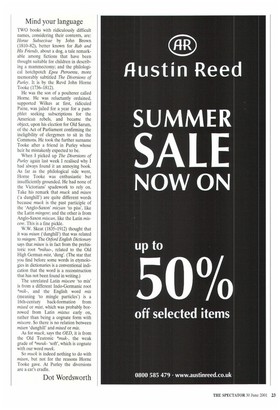Mind your language
TWO books with ridiculously difficult names, considering their contents, are: Horae Subsecivae by John Brown (1810-82), better known for Rab and His Friends, about a dog, a tale remarkable among fictions that have been thought suitable for children in describing a mammectomy; and the philological hotchpotch Epea Pteroenta, more memorably subtitled The Diversions of Purley. It is by the Revd John Horne Tooke (1736-1812).
He was the son of a poulterer called Home. He was reluctantly ordained, supported Wilkes at first, ridiculed Paine, was jailed for a year for a pamphlet seeking subscriptions for the American rebels, and became the object, upon his election for Old Sarum, of the Act of Parliament confirming the ineligibility of clergymen to sit in the Commons. He took the further surname Tooke after a friend in Purley whose heir he mistakenly expected to be.
When I picked up The Diversions of Purley again last week I realised why I had always found it an annoying book. As far as the philological side went, Home Tooke was enthusiastic but insufficiently grounded. He had none of the Victorians' spadework to rely on. Take his remark that muck and mixen Ca dunghill') are quite different words because muck is the past participle of the 'Anglo-Saxon' micyan 'to piss', like the Latin mingere; and the other is from Anglo-Saxon miscan, like the Latin miscere. This is a fine pickle.
W.W. Skeat (1835-1912) thought that it was mixen ('dunghill') that was related to mingere. The Oxford English Dictionary says that mixen is in fact from the prehistoric root *mihso-, related to the Old High German mist, 'dung'. (The star that you find before some words in etymologies in dictionaries is a conventional indication that the word is a reconstruction that has not been found in writing.) The unrelated Latin miscere 'to mix' is from a different Indo-Germanic root *mik-, and the English word mix (meaning 'to mingle particles') is a 16th-century back-formation from mixed or mixt, which was probably borrowed from Latin mixtus early on, rather than being a cognate form with miscere. So there is no relation between mixen 'dunghill' and mixed or mix.
As for muck, says the OED, it is from the Old Teutonic *muk-, the weak grade of *meuk'soft', which is cognate with our word meek.
So muck is indeed nothing to do with mixen, but not for the reasons Home Tooke gave. At Purley the diversions are a cat's cradle.
Dot Wordsworth










































































 Previous page
Previous page